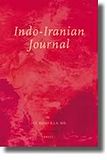Indo-Iranian Journal 54,1 (2011)
Verfasst von pw am Mi, 03/23/2011 - 22:41.
Indo-Iranian Journal
Indo-Iranian Journal / Editors-in-Chief: Hans Bakker ... - Vol. 54,1. - Leiden : Brill, 2011.
ISSN 0019-7246 (Print-Ausgabe)
ISSN 1572-8536 (Online-Ausgabe)
URL: Brill
Inhalt: 54,1 (2011)
Remmer, Ulla: The Avestan Paradigm of vaiiu- 'Air, Wind' in the Context of Irregular Accusative Singular Forms of Vowel Stems with °ąm and °∂m. - In: IIJ. - 54 (2011), S. 1-18 [Onlinezugriff]
Abstract: The paradigm of Avestan vaiiu- 'atmosphere, wind' is puzzling because of the seemingly thematic accusative sg. vaēm and because of its short root vowel a that stands in contrast to both the Old Indic counterpart vāayú- < Indo-Iranian *HuaH-iu- and the two parallel Avestan stems pāaiiu- 'shepherd' and tāaiiu- 'thief'. A usually neglected accusative singular form, transmitted only in Ny 1.1 and Ny 1.2, provides a key to the issue: vaiiąm, rather than being an irregular by-form of vāēm, appears to be the original acc. sg., which implies that vaiiu- was originally a long-diphthong inflecting paradigm with Proto-Avestan nom. sg. *uāiāuš, acc. sg. *uāiā(u)m via lex Stang → *uāiām. This preform provides a better context for the shortening of *āia/ā, > *aia/ā, yielding the final root shape of vaiiu-.
Lowe, John J.: Negated Participles in Rgvedic Sanskrit and Proto-Indo-European. - In: IIJ. - 54 (2011), S. 19-38 [Onlinezugriff]
Abstract: In Rgvedic Sanskrit present participles built to transitive roots regularly follow their corresponding finite forms in relation to argument structure. Of those participles whose argument structure differs from that of the corresponding finite forms (most often because they lack the ability to govern an accusative object), some may have originated as adjectives or may have become adjectivized. A particular group of present participles in the Rgveda which tend to remain intransitive even when formed to transitive roots are negated participles, i.e. participles compounded with the negative prefix á(n)-. This is explained by assuming that the combining of a participle with the negative prefix was originally a process of adjectival derivation. Support for this hypothesis comes from a consideration of the two forms of the negated present participle of the verb √as 'be', namely ásant- and āsant-.
Rezensionen. S. 39-98
Ähnlich
- Indo tetsugaku bukkyōgaku ronshū 2014 - 2
- JICPBS 18 (2014)
- Zeitschrift für Indologie und Südasienstudien 2013 -- 30
- ARIRIAB 17 (2013) Supplement
- ARIRIAB 17 (2013)
- MSS 2013 - Heft 67,1
- Berliner Indologische Studien 21 (2013)
- Bulletin d'études indiennes 2012 - No. 30
- Bulletin d'études indiennes 2010-2011 - No. 28-29
- Acta Tibetica et Buddhica 2013 - 6

